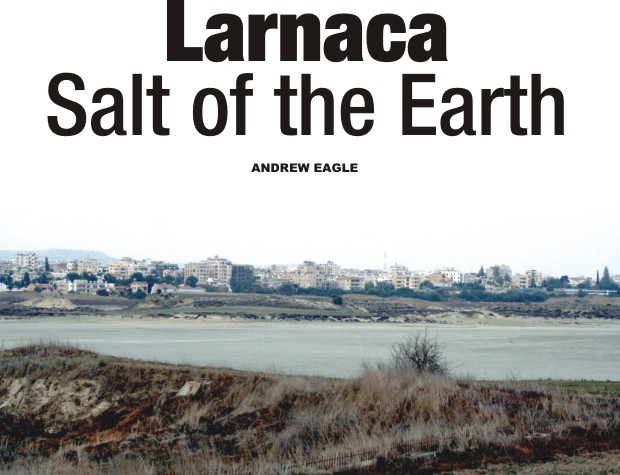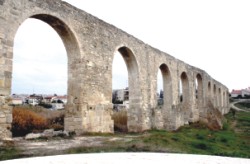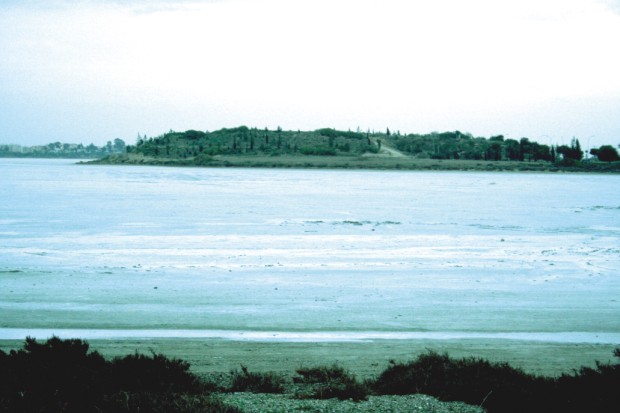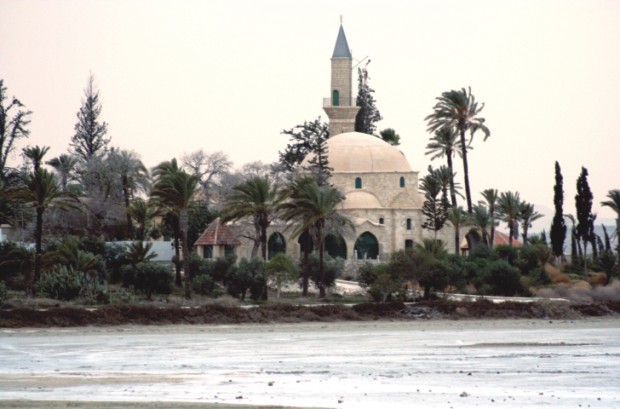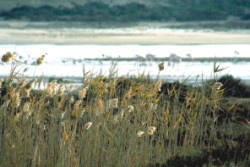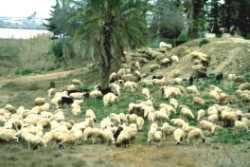| Home - Back Issues - The Team - Contact Us |
 |
| Volume 10 |Issue 20 | May 27, 2011 | |
|
|
Travel
The Sky was blocked in the east by the bookshelf apartment blocks of the compact city once called Kittim. As books row by row, side by side, people live: storage functionality for the ones commuting through the twenty-first century, life in lung enough still to taste the Mediterranean salty Air. Now they call it Larnaca, that city in Cyprus that from the Lake as though with some right covers the dawn light with its bushel. They've made a little park for themselves, the Larnacans, moulded to match the eastern shore. It's a salad buffer between the tamed and dusty, the modern and the salty. There's a little forested path they've planted to stroll along in the evenings in striped tracksuits, up and down, relaxed in the certainty of the man-made logic afforded by such a sculptured path as that. From there are they deck-chair foremen, surveyors of the scenery across the Lake. They've done all this before of course and the Salt of the Earth, the little Lake laughs to watch them. No, this is not the first time. The winter grasses know their mortality, they shall be for such a short while of the Sky and the Soil. Yearning for turning Breezes to throw open their future generations, to disperse. Birth and death and birth: the Salt of the Earth, the little Lake nods.
All lands are ancient but Cyprus was made on the first day, so it would seem, to be trampled and crushed to dust by the feet of the ages, the sheep's hooves and goats' hooves and wanderers and travellers in sandals or barefoot. Through the centuries they came, laden with armour or vulnerable in light cotton, to conquer, driving their flocks, to pray and sustain themselves. All History seems to belong here and that little Lake saw it.
To the north are two millennia in Stone, Roman, where ancestors laid slabs, raised columns and affixed arches in an aqueduct, for that most primary purpose of water-bearing. Just as the Larnacan Sun rises in the Greek language so once it did in Latin, as the people of a small Roman town went about their business, at the market, to school, to the houses of relatives, in the shadow of that aqueduct. Their thirst is gone; their water-bearer is all that's left. The Salt of the Earth heard the Water gurgling and knew their transience.
To the west are the undulating spaces for the flocks, an untamed and woolly landscape. The sheep as they wander follow these patterns, plucking grass, crushing dirt, gathering ahead, socialising, grazing and conforming. The sheep are of many directions but only one future, that of all generations. Their shepherd watches their progress, conducts their circular movements in moments in the hours of days of salty Wind currents and beating Sun. Time has stopped in that shepherd's grassy-tussock tradition, but to the Salt of the Earth he is not more than each speck of sand that remembers how things were, how they have always been. The little Lake has watched the flocks for many centuries: birth and death and birth. Umm Haram, the wet nurse of Prophet Muhammad (Peace be Upon Him) has a shrine to the south-west. In her old age it is said she had fallen from her mule and died, during the siege of Larnaca; or was she found later by that dervish Hasan? The Lake knows if people have forgotten the exact events. By the Lake's edge at Hala Sultan Tekke she was buried, as though hoping to join in the Lake's unending quality, to surpass even that. And like the Salt of the Earth she is preserved in the world, to an extent, as witnessed by people who have over the centuries arrived at Hala Sultan Tekke. There they took hope and consolation and blessings, on the south-western shore. Once there were Christians and Muslims both, revering her graveside, at the quiet place within the walls of a medieval garden. Now of course Cyprus is divided, the walls are between them and within them: Turks in the north, Greeks in the south and the pilgrims to Hala Sultan Tekke are few. The Christians don't go and the Muslims can't easily go, for the cross-island fence and the guard posts and the machine guns that protect them from themselves. Because the ever-witnessing hills of Cyprus are not the ever-replenished plains of Bangladesh.
And beyond even that there's futility in it, the shrine: for the Salt knows it will outlast even her shrine: the preservation of Stone is not the same as the eternity she may have elsewhere. To the south is the airport that brings northern Europeans in their thousands to lay about in deck chairs on Larnaca's beach. Their busy lives of shuffling to work and home and daily chores in the darkness of winters are paused in pursuit of the Mediterranean Sun. It brings Bengalis too, that airport, the ones that congregate in the squares of the capital Nicosia on Sundays, who've come in search of work or education. In the distance the metallic bodies of the plane-contraptions, the tips of wings and tails squint and glimmer. The Salt of the Earth laughs to see them: for how long? For how long shall it be before there's a new age, a return to the wooden sea-craft of earlier times or something else? The only surety in civilisation, the little Lake knows, is birth and death and rebirth. The Salt of the Earth sees how they pretend to know what they do. It's not beside the Lake but in Larnaca town that empty tomb; but even at the Lake is the presence of Lazarus of Bethany, the first Bishop of Kittim. He was in Cyprus for his second death, before his second corpse was captured for Constantinople. Jesus of Nazareth had rescued him after four days in his first tomb, so it is written, the story of Martha and Mary and Jews in mourning; and it is said he fled to Cyprus in fear of his second life. But of course that too came to its end. Did he find eternity, by the grace of God? Perhaps he did. And yet it's not around the Lake's edge nor in the town that has the final say, but in its middle. What sort of God was it that painted the flamingos pink? How was it decided to initiate their migrations from Africa, to Cyprus, to Africa again? How were those routings plotted, coordinates decided? Who understands avian ways? In the cycle of life the little Lake on the island of Cyprus, Salt of the Earth, rejoices in the ludicrous brilliance of flamingo feathers.
Copyright (R) thedailystar.net 2011 |
